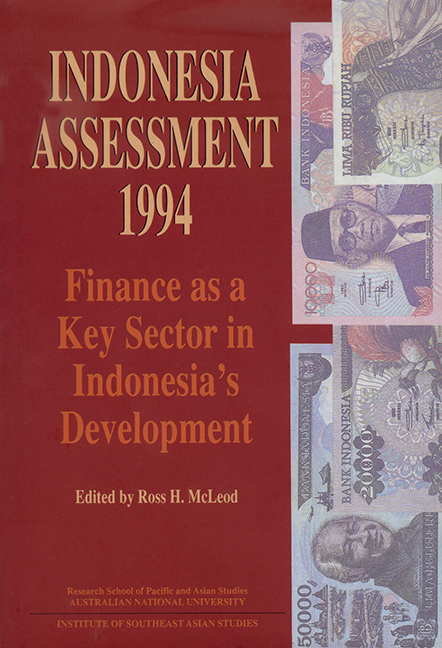Book contents
- Frontmatter
- Contents
- Tables, figures, appendices
- Foreword
- Glossary
- Contributors
- Acknowledgements
- 1 Introduction
- PART A ECONOMIC AND POLITICAL DEVELOPMENTS
- PART B FINANCE AS A KEY SECTOR IN INDONESIA'S DEVELOPMENT
- I The Reform Process
- II Monetary and Exchange Rate Policy
- 7 Problems of implementing monetary policy in Indonesia
- III Banking Sector Reforms
- IV Domestic and International Capital Markets
- V Small-scale Finance
- References
- Index
7 - Problems of implementing monetary policy in Indonesia
from II - Monetary and Exchange Rate Policy
Published online by Cambridge University Press: 21 October 2015
- Frontmatter
- Contents
- Tables, figures, appendices
- Foreword
- Glossary
- Contributors
- Acknowledgements
- 1 Introduction
- PART A ECONOMIC AND POLITICAL DEVELOPMENTS
- PART B FINANCE AS A KEY SECTOR IN INDONESIA'S DEVELOPMENT
- I The Reform Process
- II Monetary and Exchange Rate Policy
- 7 Problems of implementing monetary policy in Indonesia
- III Banking Sector Reforms
- IV Domestic and International Capital Markets
- V Small-scale Finance
- References
- Index
Summary
The recent monetary history of Indonesia is full of interesting cases of the way in which monetary policy is practised in a developing country. This short note is neither an account of that history nor a chronicle of such cases. My purpose is much more modest, namely, to sketch what I consider to be the major complications associated with the practical conduct of monetary policy in Indonesia at present. The views expressed here are entirely subjective; they constitute my own impression and perspective on the issues, drawing on my varying degrees of involvement in monetary policy formulation and implementation in Indonesia in the past decade or so, but particularly in the past eighteen months since my assignment to Bank Indonesia.
Information gap
Let me start by stating that in Indonesia (but I suspect also in many other developing countries) much of the daily conduct of monetary policy is only a little more than improvised actions (or non-actions) by the monetary authorities, taking their decisions on the basis of incomplete information in order to carry the economy through to another day. While this is an obvious exaggeration, I believe it contains some grains of truth. The problem of lack of information in practical policy making is real and ongoing. The uncertainty as to whether the right decisions have been made always haunts policy makers. And clearly, the wider the information gap, the more intense are such feelings. Pressed by time, and by the rapidity of the flow of events, policy-makers almost always have to make some leap of faith in reaching their decisions, and once the decisions are made they still need to keep their fingers crossed. It is for this reason that since being assigned to the Bank I have given upgrading the quality of information flows into various policy fora a very high priority.
Over the medium term, we would like to think that we are on firmer ground. There is more time to think through the problems, and more opportunity to gather information; consequently there is less need to improvise.
- Type
- Chapter
- Information
- Indonesia Assessment 1994Finance as a Key Sector in Indonesia's Development, pp. 119 - 128Publisher: ISEAS–Yusof Ishak InstitutePrint publication year: 1994

